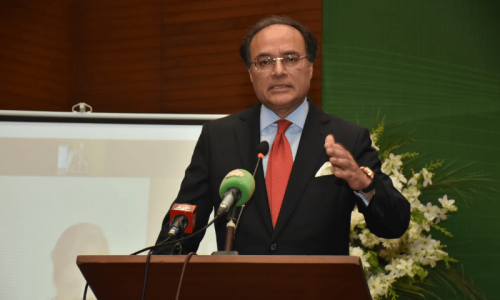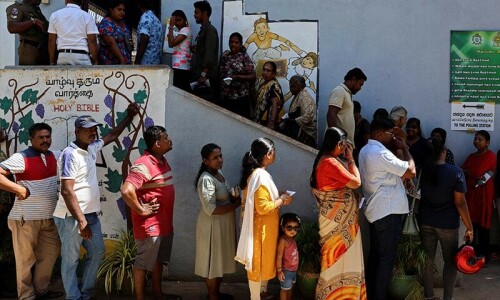 THE government has raised wheat support price to Rs950 per 40kg for the coming crop and has also provided subsidy of Rs27 billion on DAP fertiliser to boost wheat production and ensure food security.
THE government has raised wheat support price to Rs950 per 40kg for the coming crop and has also provided subsidy of Rs27 billion on DAP fertiliser to boost wheat production and ensure food security.
The Punjab government has initiated green tractor scheme and is arranging Kissan Melas for exchange of views among farmers. The federal government is also going to initiate tractor scheme for small farmers. These are the steps which have been taken in time to raise wheat production.
The increase in wheat price will motivate farmers to bring more and more areas under wheat cultivation and to some extent decrease smuggling to neighbouring countries. Besides this, there are certain other factors which play pivotal role in productivity of wheat. The four basic factors which significantly enhance the crop yield are (a) timely sowing, (b) balanced use of fertiliser, (c) weed control and (d) optimum irrigation.
Timely sowing is the prerequisite to harvest good yield of the crop. The best time for sowing wheat is from November 1-25. About 50 per cent of the farmers sow their wheat crop late in December and/or even in January. It has been estimated that after November 25 one day delay in wheat planting results in yield reduction by 37-40 kg/ha.
Timely sown crop results in good germination, healthy seedlings and early stand establishment. The plants find sufficient time for satisfactory completion of different growth stages. It receives more period of sunshine which is converted to carbohydrates through photosynthesis. These ultimately results in higher grain yield.
A couple of weeks ago prices of fertiliser were suddenly raised so high that it was out of the reach of farmers. DAP was sold in black market at Rs5,200-5,700/bag. Now with the provision of subsidy by the government the prices have been reduced and DAP and urea are available at Rs3,100-3,300/bag and Rs700-800/bag, respectively.
The concerned authorities should ensure that fertiliser is easily available to farmers on reasonable price announced by the government. Shortage of fertiliser and exorbitant price increase difficulties of already poor and financially constrained farmers which will ultimately affect their crop yield and reduce the national production target.
Efficient use of fertilisers becomes more crucial in this scenario of costly fertilisers. The efficiency of phosphate fertilisers (DAP, TSP, NP) may be enhanced through band application. In this technique fertiliser is applied with seed-cum-fertiliser drill at the time of sowing on side or below the seeds of wheat. This is only possible in the fields where crop is sown in lines by using recommended drill sowing (tractor or animal driven) method.
The availability of nutrient to plant roots is increased and they can easily absorb the nutrients from soil as compared to broad cast method. The losses through phosphorus fixation with soil are reduced. In our conditions, the losses of nitrogenous fertilisers are more as compared to other fertilisers. Under high temperature conditions like ours, the main factor of nitrogen loss is volatilisation.
Usually our farmers broadcast fertiliser too early before the application of irrigation that results in more than 50 per cent of fertiliser wastage. To minimise losses, the nitrogenous fertilisers (urea, CAN, Ammonium sulphate) should be applied when there is adequate moisture present in the soil. The best way is to broadcast fertiliser just after the application of water or apply irrigation immediately after the application of fertiliser. Moreover, 1/3rd dose of nitrogenous fertilisers should be applied at the time of planting while remaining in two splits.
Uncontrolled weeds reduce wheat yield by 7.42 million tones (26 per cent losses in yield) and cause Rs112 billion per annum monetary losses to the national economy. Weeds compete with the crop plants for nutrients, moisture, light and space and also release some toxic chemicals which inhibit growth of the crop. Wild oat, canary grass, lambs quarters, field bindweed, broad leaved dock and sweet clover are major weeds of wheat which severely affect the growth and yield.
Timely control of weeds results in vigorous and competitive crop which will enhance yield. Integrated weed management (IWM) strategy is very helpful not only in providing efficient weed control but also reducing herbicide use, minimising herbicide resistant weeds and conserving the environment. All measures of integrated weed management system as selection of competitive wheat cultivars, use of clean seed, optimum seed rate, stale seed bed, use of harrows, intercropping, allelopathy and herbicides should be followed.
The use of herbicides may be the last option for weed control on sustainable basis. Suitable herbicide should be selected after careful observation of the field depending upon weed flora. There are separate herbicides to control broad leaved, narrow leaved and both kinds of weeds.
Herbicides belonging to different chemical groups should be applied in a rotation to avoid development of resistance in the weeds against herbicides. Use of allelopathic crop water extracts alone or in combination with lower doses of herbicides is another viable and cost effective method for sustainable weed management.
Irrigation is the fourth critical factor affecting crop yield. Irrigation at critical stages must be applied to harvest good yield. Five irrigations are recommended for wheat however, irrigation at three critical stages as tillering (18-22 days after sowing except wheat sown after rice), booting and grain formation should not be missed. In current season we are facing 40 per cent shortage in canal water. Tube wells will supplement the canal water to fulfill the requirement.
Diesel and electricity are the two main sources of energy to run tube wells. However, increased costs of diesel and electricity plus unscheduled load shedding are the matters of great concern. Diesel price is Rs68/litre which was fixed when oil prices internationally were ever high and crossed record $147/barrel. Now oil prices in the international market have gone down to $61/barrel. The government and oil companies are earning lot of money through oil trade with out providing any relief to deprived farmers.
Likewise, electricity bills have gone very high in September. Farmers are also victim of this electricity shock. They have been affected by higher bills as domestic as well as agricultural users. Some farmers reported that there is 100 per cent increase in electricity bills. In addition to this load shedding of electricity is also a big hindrance to pump water by tube wells. It is need of the hour to lower the fuel as well as electricity charges to ensure continuous supply of irrigation water.
Efficiency of our irrigation system is only 35 per cent. It should be enhanced through reducing conveyance and application losses by better policy and management. Farmers can minimise irrigation losses at field level by cleaning water channels, adopting bed sowing, controlling weeds and applying restricted amount of water according to requirement of the crop. By emphasising on above mentioned four factors average national yield of wheat can be enhanced significantly at least by 20-25 maunds/hectare.
















































Dear visitor, the comments section is undergoing an overhaul and will return soon.